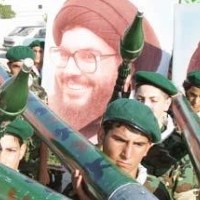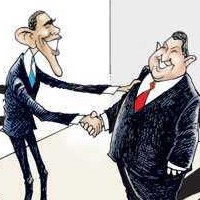![]()
Sun, Jan 30, 2011 | WikiLeaks
WikiLeaks: U.S. Discusses Iran and Gaza with Mubarak’s Son
During an hour-long meeting on February 17 [2009], Gamal Mubarak discussed with Senator Joseph Lieberman the problems with Gaza and Palestinian reconciliation, as well as the broader political split within the Arab world. Senator Lieberman sought Gamal’s advice on ways for the U.S. to engage Iran; Gamal offered that the best way to defeat Iranian ambitions in the region is to make progress on the Israeli-Palestinian peace process.
Source: WikiLeaks
2009-02-23 T13:07:00
S E C R E T CAIRO 000326
FOR NEA AND H
E.O. 12958: DECL: 02/23/2019
TAGS: PREL, KPAL, ECON, IR, SY, IZ, EG, IS, QA
SUBJECT: SENATOR LIEBERMAN’S FEBRUARY 17 MEETING WITH GAMAL MUBARAKClassified By: Ambassador Margaret Scobey for reasons 1.4 (b) and (d).
——-
Summary
——-
1. (C) During an hour-long meeting on February 17, Gamal Mubarak discussed with Senator Joseph Lieberman the problems with Gaza and Palestinian reconciliation, as well as the broader political split within the Arab world. Senator Lieberman sought Gamal’s advice on ways for the U.S. to engage Iran; Gamal offered that the best way to defeat Iranian ambitions in the region is to make progress on the Israeli-Palestinian peace process. Unfortunately, Qatar is playing “spoiler” in order to get “a seat at the table.” Gamal, a former international banker, opined that the U.S. needed to “shock” its financial system back to health, and said that Egypt — which had so far escaped much of the pain of the global economic crisis — was preparing to face tough economic times ahead. The Ambassador, Senator Lieberman’s foreign policy adviser, and the ECPO MinCouns as note taker were also present. End summary.
—-
Gaza
—-
2. (C) After welcoming Senator Lieberman, Gamal began by criticizing the Israeli government’s “last minute” decision not to move forward on the Gaza ceasefire without the release of Corporal Shalit. This complicates several aspects of the Israel Palestinian conflict, Gamal explained, not simply the situation in Gaza. The various Palestinian factions are due to begin reconciliation talks in Cairo “in about 10 days” and this development will make those discussions more difficult. It makes Egypt look bad, and strengthens Hamas.
————————————–
Iranian Exploitation of Arab Divisions
————————————–
3. (C) Another complicating factor, Gamal explained, is the current split within Arab ranks between “moderates” (Egypt and Saudi Arabia) and “radicals” (Syria and Qatar). This polarization, he opined, has “paralyzed the peace process.” Iran has skillfully exploited — using Hamas — the lack of movement towards peace. As long as there was a viable peace process, Gamal averred, “there was no place for Iran.” The best way to thwart Iranian ambitions in the region, according to Gamal, is to reinvigorate the Israeli-Palestinian peace process. What is also needed, he continued, is a unified Palestinian government. “The Palestinians need elections, both presidential and parliamentary.”
——————————-
U.S. Re-engagement with Tehran?
——————————-
4. (C) Senator Lieberman asked Gamal if he thought the United States should re-engage with Iran. “As long as Ahmedinejad is there, I am skeptical,” Gamal responded. Senator Lieberman said he shared that skepticism, but explained that the new administration believes the U.S. should try to engage the Iranians, but no clear strategy has yet emerged in Washington; Dennis Ross has been tasked with “reviewing” the situation. The one thing that is clear, Gamal stressed, is that by removing Saddam, the U.S. opened the door for Iran to flex its muscles and spread its influence throughout the region. “Like it or not, Saddam was a stumbling block to Iranian aspirations. His fall led directly to an increase in Iranian influence on the region.” Now, it is all the more important not to send a message of weakness to the Iranians, Gamal said, “neither from the U.S., nor from the moderates in the region.” We cannot “concede to their policy of aggression.”
5. (C) There are many in the region, Gamal explained, who believe that the U.S. was weakened by its actions in Iraq, and that Iran was strengthened. Furthermore, there is a perception that the U.S. has been hurt by the economic crisis and that it will be more inward looking for the next few years. Therefore, the Americans, it is said, will deal with problems in the region in a “less confrontational” fashion, and “may be willing to compromise. Iran is working hard to convince others that this is the case.” This creates a very dangerous situation for moderate states like Egypt, Gamal stressed. Noting that there was some truth in this analysis, particularly concerning the economic straits the U.S. is in, Senator Lieberman said that the U.S. will nonetheless engage in an even more aggressive Middle East foreign policy than previously, as evidenced by President Obama’s choice of
Secretary Clinton and Special Envoy Mitchell. Gamal welcomed this reassurance, noting that the GCC states in particular are “terrified” of Iran. Just the previous week, he said, an Iranian general had said publicly that Bahrain “has always been part of Iran,” as well as the Tunb Islands.
—–
Qatar
—–
6. (C) Senator Lieberman then asked Gamal for his assessment of Qatari behavior. They are coordinating closely with Syria and Iran, Gamal said, “in an orchestrated attack on Egypt and other moderate Arab states.” Qatar has enabled Hamas to hamper every effort we have made to cement a ceasefire in Gaza. For some reason, Qatar seems to want to play the role of spoiler, Gamal surmised. “Even regarding the March 2nd Gaza conference we are hosting, they have called for another Arab only meeting in Doha just two days before.” In response to Senator Lieberman’s question as to Qatari motives, Gamal responded, “They just want a place at the table, no matter what.”
—————
Egypt’s Economy
—————
7. (C) Turning to the impact of the global financial crisis on Egypt, Gamal — a former international banker — said that while Egypt has so far escaped the worst effects of the crisis, “we are bound to feel the brunt of it eventually.” Because Egypt’s banking sector was thoroughly overhauled about five years ago, he explained, it is in much better shape than it night have been. Nonetheless, Egypt expects to see significantly lower GDP figures in 2009; “the most recent quarterly numbers are already way down.” The one ray of good news, Gamal said, is that inflation also is down; “nonetheless, we know we are in for a rough ride.” Egypt will be watching the United States very closely, Gamal said. Senator Lieberman asked for his advice as an experienced international financier. “Your banking system needs a shock,” Gamal offered. “You need a dramatic fix. Unless you get the banking sector revived, nothing else will come around.” However, Gamal continued, a piecemeal approach to the problem will not be enough; you need to inject even more money into the system than you have, and you need to get as much of the bad debt as possible out of it; “you must remove the toxic assets from the books” and restore the confidence of investors and consumers. Senator Lieberman agreed on the need for bold measures to restore confidence.
8. (U) This cable was cleared by Senator Lieberman.
SCOBEY



 RSS
RSS












#WikiLeaks: #US Discusses #Iran and #Gaza with #Mubarak's Son | #Israel http://j.mp/hjhcEs
RT @CrethiPlethi: #WikiLeaks: #US Discusses #Iran and #Gaza with #Mubarak's Son | #Israel http://j.mp/hjhcEs